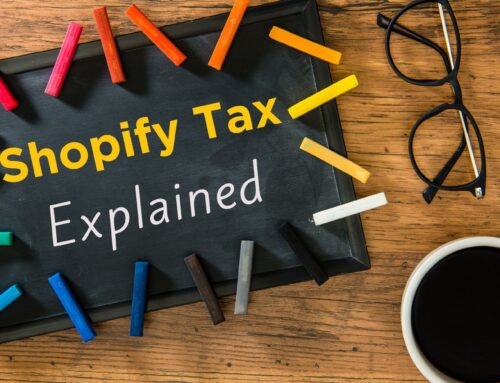
Sales taxes can be intimidating for e-commerce sellers. They can feel overwhelmed because the rules for online sellers are much more complicated than sales tax rules for brick and mortar businesses. This is because they are often selling to people in different states, or even different countries, and each location has unique rules about collecting sales taxes, which have to be reconciled. How do we do that? There are 5 essentials you need to know about sales taxes for e-commerce.
Click on the link below to watch my video on 5 Essentials every e-commerce seller should know about sales tax
#1 – The rules have changed

First, you have to understand that the rules have changed. There’s a lot to keep up with. If you want to keep your business in good shape and stay out of trouble with the powers that be, make sure you have current information. That means don’t rely on tax advice from online forums, Facebook groups, or friends and family unless they’re tax and accounting professionals who stay up-to-date.
You need to make sure you’re keeping up with the latest rules, which is what I’m sharing with you (at least as of the time that I’m sharing this article).
#2 – Each state has different rules

Number two, every state has different rules. Sales tax varies by state and may even vary by jurisdiction within that state. So, again, when you’re seeking out advice on sales tax, make sure it’s specific to your state or it won’t be accurate. Yep, that’s pretty simple but hold on because it’s about to get more complicated.
# 3 – Nexus

What is nexus? I know it’s not a word we normally use, so let’s define what nexus is.
According to the Sales Tax Institute, sales tax nexus defines the level of connection between a taxing jurisdiction, such as a state, and an entity, such as your business.
Until this connection is established, the taxing jurisdiction cannot impose its taxes on you. So how is that connection established?

One way is physical presence, which is what many brick and mortar businesses have been familiar with. You would collect sales taxes for the states where you have a physical presence. This could be the physical location of a store or possibly the location of warehouses.

Now we also have economic nexus. Economic nexus allows states to look at criteria beyond physical presence in evaluating whether you have a connection to that state.
In June of 2018, the U.S. Supreme Court upheld the ruling between South Dakota and Wayfair, Inc. And this allowed South Dakota to begin collecting sales taxes based on what we now call economic nexus. Since that ruling, about 40 states have now enacted their own economic nexus rules.
#4 – Economic nexus

The fourth essential thing you need to consider is economic nexus. As I said before, every state has different tax rules. This applies to economic nexus rules as well.
Many states have set up a threshold, requiring you to file, register, and collect taxes if you exceed it. Some thresholds are dollar amounts and some are based on the number of transactions.
In the state of Kansas, however, there is no threshold. So, if you have any sales in the state of Kansas, you may have economic nexus there. I highly encourage you to see if you have sales in the state of Kansas and then look into their rules for registering in their state and collecting sales taxes.
#5 – Marketplace facilitator states

The final essential you need to consider is marketplace facilitator states. If you sell via the big online marketplaces like Amazon, Wayfair, Walmart, Etsy, etc. then you are likely impacted by these rules. Under marketplace facilitator laws, the obligation is imposed on the online marketplace. So again, Amazon, Walmart, Wayfair, Etsy, etc. are responsible to collect and remit sales taxes on your behalf if you sell on those marketplaces.
While it is great that you may not need to register to collect and remit sales taxes in these marketplace facilitator states, you still need to be aware that not every state is a marketplace facilitator state.
Resources
Yes, it is complicated. There’s a lot to keep up with, so I’m going to share with you some very useful resources.
Here are some great resources from Avalara. The first one is the find your nexus tool. In this tool, you can select the states in which you’re doing business, fill out some information, and learn about your sales tax exposure.
Another great tool is the sales tax laws by state. You’ll find really helpful tables that go state-by-state, showing you all of the different rules that apply to that state including economic nexus laws. You can just look at each state and see the enforcement date, included transactions, and very importantly, the sales transactions threshold. Remember that many states have these thresholds, and until you meet those thresholds, then you don’t have to worry.
Finally, we’ve got a state-by-state guide to marketplace facilitator laws. Here, you can view each state and learn the unique facilitator laws and whether you need to be collecting in any of the states you operate in.
Need Help?
Now that I’ve shared 5 essentials you need to know about sales taxes for e-commerce, you can see that there’s nothing simple about e-commerce sales tax laws. They can eat up your time and cause a lot of stress too.
If you would like to reach out to me, my firm VM Wasek specializes in e-commerce for Shopify, Amazon, and Walmart sellers. Click on this link to learn more about my services and see if my team is a good fit to help you elevate your e-commerce business and reach your goals.




